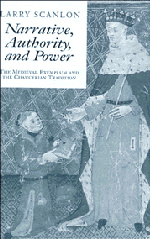Book contents
- Frontmatter
- Contents
- Acknowledgments
- INTRODUCTION: EXEMPLARITY AND AUTHORITY IN THE MIDDLE AGES
- PART 1 THE LATIN TRADITION
- PART 2 THE CHAUCERIAN TRADITION
- 6 Exemplarity and the Chaucerian tradition
- 7 Canterbury Tales (I): from preacher to prince
- 8 Canterbury Tales (II): from preaching to poetry
- 9 Bad examples: Gower's Confessio Amantis
- 10 The Chaucerian tradition in the fifteenth century
- Bibliography
- Index
8 - Canterbury Tales (II): from preaching to poetry
Published online by Cambridge University Press: 16 September 2009
- Frontmatter
- Contents
- Acknowledgments
- INTRODUCTION: EXEMPLARITY AND AUTHORITY IN THE MIDDLE AGES
- PART 1 THE LATIN TRADITION
- PART 2 THE CHAUCERIAN TRADITION
- 6 Exemplarity and the Chaucerian tradition
- 7 Canterbury Tales (I): from preacher to prince
- 8 Canterbury Tales (II): from preaching to poetry
- 9 Bad examples: Gower's Confessio Amantis
- 10 The Chaucerian tradition in the fifteenth century
- Bibliography
- Index
Summary
In the Pardoner's Prologue and Tale critique becomes affirmation. Chaucer returns to the anti-clericalism, and especially the anti-fraternalism of the Friar's and Summoner's Tales, but here he makes them the platform for a more general adumbration of the moral authority of narrative. The Pardoner clearly identifies himself as a mendicant, who “wol preche and begge in sondry lands” (VI, 443). Modeled on the anti-fraternal Faus Semblant from the Romance of the Rose, he draws many of his characteristics from the anti-fraternal tradition: his itineracy, his threat to the secular clergy (in the person of the local parson (I, 701-06)), his hypocritical avarice, his sharp practices, and most of all his translation of spiritual values into commodities. For all of that, Chaucer seems more interested in moving past his specific institutional position to the larger issue of the general relation between the doctrinal and the lay, an issue which the Pardoner enables him to stage in starkly discursive terms. This shift to the discursive continues in the next fragment, particularly at its end where Chaucer simultaneously examines the specificities of lay political authority. The final tale of Fragment VII, the Nun's Priest's Tale has sometimes been taken as the ultimate expression of Chaucer's commitment to the autonomy of poetic discourse. My purpose in this chapter is to show that even that commitment is thoroughly intertwined with a laicist politics.
- Type
- Chapter
- Information
- Narrative, Authority and PowerThe Medieval Exemplum and the Chaucerian Tradition, pp. 192 - 244Publisher: Cambridge University PressPrint publication year: 1994



